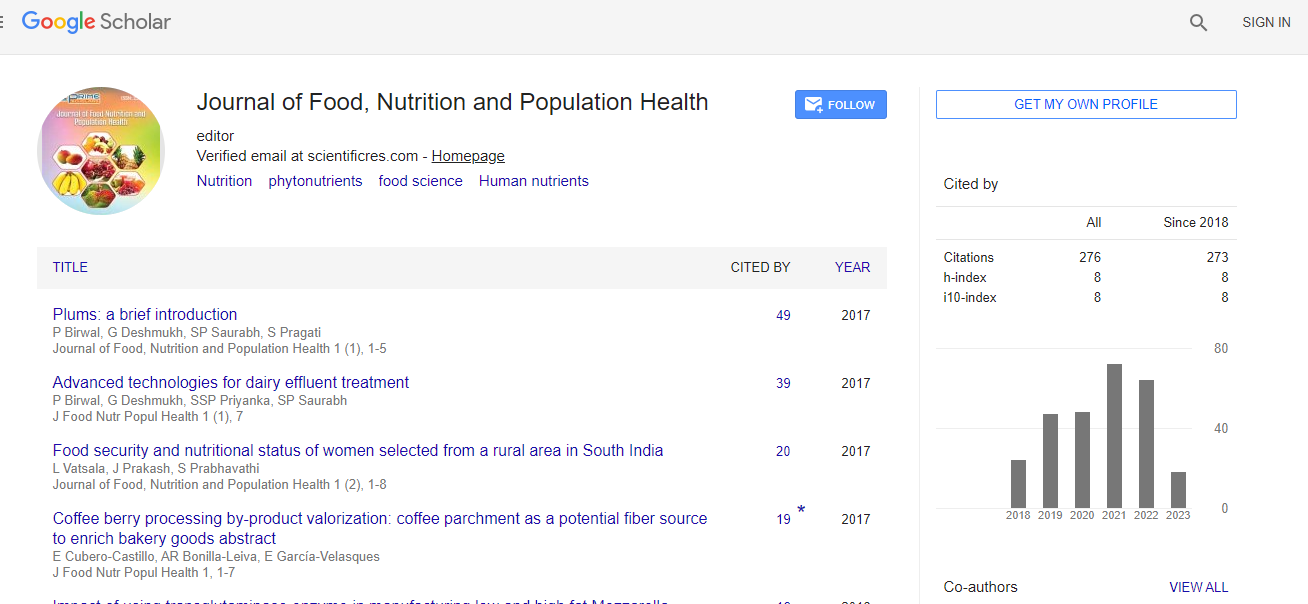Commentary - (2024) Volume 8, Issue 3
Pregnancy Diet and Lifestyle Habits for a Healthy Phase
Mio Takahashi*
Department of Maternal and Child Care, Okayama University, Japan
*Correspondence:
Mio Takahashi,
Department of Maternal and Child Care, Okayama University,
Japan,
Email:
Received: 02-Sep-2024, Manuscript No. IPJFNPH-24-21232;
Editor assigned: 04-Sep-2024, Pre QC No. IPJFNPH-24-21232 (PQ);
Reviewed: 18-Sep-2024, QC No. IPJFNPH-24-21232;
Revised: 23-Sep-2024, Manuscript No. IPJFNPH-24-21232 (R);
Published:
30-Sep-2024, DOI: 10.21767/2577-0586.8.3.28
Description
Pregnancy represents a critical phase of life requiring careful
attention to diet and lifestyle to ensure the health and
well-being of both the mother and the developing fetus. A
balanced diet and healthy lifestyle choices during pregnancy
can positively influence maternal health, fetal development,
and the overall pregnancy experience. This review explores
essential dietary recommendations and lifestyle habits for
a healthy pregnancy. Essential for fetal growth and tissue
development. Pregnant women should aim for approximately
70 gms-100 gms of protein daily, which can be obtained from
lean meats, poultry, fish, eggs, dairy products, legumes, and
nuts. Provide energy and support the growing fetus. Emphasize
complex carbohydrates such as whole grains, fruits, and
vegetables over refined sugars to maintain stable blood sugar
levels. Healthy fats are crucial for fetal brain development and
hormone production. Include sources of omega-3 fatty acids,
such as fatty fish (e.g., salmon), flaxseeds, and walnuts. Vital
for preventing neural tube defects and supporting cell growth.
Pregnant women should consume 600-800 micrograms of folic
acid daily from leafy greens, fortified cereals, and legumes.
Supports increased blood volume and prevents anemia. Good
sources include red meat, poultry, beans, and fortified cereals.
Pairing iron-rich foods with vitamin C sources (e.g., oranges,
strawberries) enhances absorption. Necessary for fetal bone
and teeth development. Aim for 1,000 milligrams-1,300
milligrams of calcium per day from dairy products, fortified
plant milks, and leafy greens. Adequate hydration is crucial
for maintaining amniotic fluid levels and supporting increased
blood volume. Pregnant women should drink at least 8-10
glasses of water daily and adjust intake based on activity level
and climate. Regular physical activity helps manage weight
gain, improve mood, and enhance overall fitness. Activities
such as walking, swimming, and prenatal yoga are generally
safe and beneficial. Aim for at least 150 minutes of moderateintensity
exercise per week. Consult with a healthcare provider
to tailor exercise plans to individual needs and any pregnancy
complications. Adequate rest is vital for maternal health and
fetal development. Aim for 7 hours-9 hours of quality sleep
each night and establish a regular sleep routine. As pregnancy
progresses, sleeping on the left side is recommended to improve
blood flow and reduce pressure on the uterus. Pregnancy can
be a time of heightened emotional stress. Practices such as
mindfulness, relaxation techniques, and prenatal counseling
can help manage stress levels. Building a support network
of family, friends, and healthcare providers offers emotional
and practical support throughout pregnancy. Avoid alcohol,
tobacco, and recreational drugs, as these can have detrimental
effects on fetal development and pregnancy outcomes. Consult
with a healthcare provider before taking any medications
or supplements to ensure they are safe during pregnancy.
Consistent prenatal visits allow for monitoring the health of
both mother and fetus, early detection of potential issues,
and timely interventions. Follow recommended screenings
and tests to assess fetal development and address any health
concerns. Plan meals to include a variety of nutrient-dense
foods and avoid skipping meals to maintain steady energy
levels and nutrient intake. Choose nutritious snacks such as
fresh fruit, yogurt, and nuts to keep hunger at bay and provide
additional nutrients. Seek advice from a registered dietitian or
nutritionist specializing in prenatal nutrition for personalized
dietary recommendations. Participate in prenatal education
classes to learn about healthy pregnancy practices, childbirth
preparation, and postpartum care. Maintaining a healthy diet
and lifestyle during pregnancy is essential for the well-being
of both the mother and the developing baby. By focusing on
balanced nutrition, regular physical activity, adequate rest, and
emotional support, pregnant women can enhance their overall
health and contribute to a positive pregnancy experience.
Acknowledgement
None.
Conflict Of Interest
None.
Citation: Takahashi M (2024) Pregnancy Diet and Lifestyle Habits for a Healthy Phase. J Food Nutr Popul Health. 8:28.
Copyright: © 2024 Takahashi M. This is an open-access article distributed under the terms of the Creative Commons Attribution License, which permits unrestricted use, distribution, and reproduction in any medium, provided the original author and source are credited.

